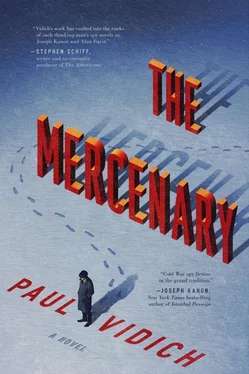“Well, Elizabeth, let’s move away from the noise.”
People in the lobby still mingled in small groups, and the official photographer recorded the event for the Agency’s newsletter. And it was when Mueller led Elizabeth past the photographer that he happened to see Natalya standing alone at the wall of Vermont marble. She was quiet, dignified, and unapproachable in her contemplation. She had raised her hand and was touching the newly carved black star.
“Well?” the reporter pressed. “Who was he?”
Mueller turned back to the reporter. “These ceremonies are always sad events for me,” he said. “The men and women on that wall are like the men and women in Arlington—and it’s easy to glorify their heroism. It’s also important not to dress things up too much.” He smiled. “Someone more eloquent than me said it best: Spying is like war. It’s a dirty business. Shed war of its glory, which it gathers in the fullness of time when events are rewritten by writers like you, trying to imagine the battlefield for the rest of us. But shed war of its glory and a soldier’s job is to kill. It’s that simple. And so, shed espionage of its popular mythology, the spy’s job is to lie, deceive, and betray trust. The only value to the soldier’s killing, or the spy’s betrayal, is the worth of the cause they serve.”
Mueller sipped his martini. He rarely drank martinis, but to honor the fallen man’s memory, he’d asked for the drink that Garin had notoriously abused. He alone appreciated the small gesture of communion.
Elizabeth was assiduously taking down what Mueller had said, which produced in him a sense of importance and encouraged him. He had formed thoughts about Garin the man, Garin the spy, and the business of espionage, using his firsthand memories, interviews, and the diary, but he had not shared his thoughts. Now he was the head of the whole enterprise. and the martini helped him speak more freely, even candidly. Perhaps a bit cynically.
“Spies are mercenaries at heart,” he said. “Like well-paid stuntmen, we do our tricks and then move offstage and are forgotten. Other case officers have great ambitions to do good in the world, but they never get the opportunity to leave their mark. Peace intervenes. They too are forgotten. But when an ordinary man, such as the man we honored today, gives his life for a political cause and has an impact on the course of history, his story is worth telling—and we forget his lies, deceits, and betrayals.”
Mueller put away the rest of his drink, feeling loose. He turned away from the reporter and saw the crowd had thinned. He too went for his coat on the rack and saw there was one other that hadn’t been claimed.
Natalya stood at the marble wall with her hand over her mouth, crying. The afternoon light had softened and deepened, washing the wall of black stars in a flaming sunset. He watched her until finally she stirred and took her coat from the rack. Mueller waited for her to approach. He stood in the center of the lobby on the radiating compass points of the Agency’s shield. She walked with a ballerina’s poise and carried her coat over her arm. He saw a brave, sad expression on her face. Mueller didn’t think he had the strength, or the presence of mind, to have a conversation, but he found his voice when she stopped in front of him.
“He was a good man,” he said. “He cared for you. He wouldn’t admit it, but he did.”
She smiled a wan, forlorn smile. “I don’t need your lies to feel better.” She looked ready to say more, but she didn’t, and she walked away. But coming to the lobby doors, she happened to turn. “You’re no better than he was. You’re all the same.”
THIS BOOK WOULD NOT HAVE been possible without my agent, Will Roberts, whose keen editorial eye helped deepen the story and shape its characters. Katie McGuire, my editor at Pegasus Books, improved the manuscript with her subtle insights and sharp pencil. John Beyrle, US ambassador to the Russian Federation 2008-2012, provided invaluable assistance with street names, Moscow life, and Russian vocabulary that only someone who was a consular officer in the American Embassy in 1985 would have. I want to acknowledge the book’s early readers, particularly Rae Edelson, Bruce Dow, and Josh Freeman. Special thanks to my fellow writers in the Neumann Leathers Writers Group—Mauro Altamura, Amy Kiger-Williams, Aimee Rinehart, Dawn Ryan, and Brett Duquette—who were the novel’s first readers. Fred Wistow, Andrew Feinstein, Brendan Cahill, Kelly Luce, Helen Phillips, Lauren Cerand, Kevin Larimer, John Copenhaver, Susan Isaacs, Jayne Anne Phillips, Sarah Russo, Milena Deleva, Elizabeth Kostova, Polly Flonder, and Nahid Rachlin have been generous with their support and encouragement over the years.
Several books were indispensable sources of information about the Soviet Union and the interplay of the CIA and the KGB. They are: Echoes of a Native Son by Serge Schmemann (Vintage Books, 1997); Spy Handler by Victor Cherkashin with Gregory Feifer (Basic Books, 2005); Bears in the Caviar by Charles Thayer (Russian Life Books, 2015); The Billion Dollar Spy by David Hoffman (Anchor Books, 2016); Mole by William Hood (Brassey’s US, 1993); Tower of Secrets by Victor Sheymov (Naval Institute Press, 1993); Next Stop Execution by Oleg Gordievsky (Macmillan, 1995); and The Master of Disguise by Antonio J. Mendez (Harper, 2000).
I owe particular thanks to my sons, Joe and Arturo, who have helped me see the world differently, and my wife, Linda, gracious person, generous mother, loving partner, and expert on Shakespeare.

PAUL VIDICHis the acclaimed author of three previous novels, including The Coldest Warrior , also available from Pegasus Crime. He was a senior executive in the entertainment industry for over twenty years before he turned to writing full-time. His fiction and nonfiction have appeared in the Wall Street Journal, LitHub, CrimeReads, Fugue , and The Nation . He lives in New York City.

http://www.pegasusbooks.com
An Honorable Man
The Good Assassin
The Coldest Warrior
THE MERCENARY
Pegasus Crime is an imprint of
Pegasus Books, Ltd.
148 West 37th Street, 13th Floor
New York, NY 10018
Copyright © 2021 by Paul Vidich
First Pegasus Books cloth edition February 2021
Interior design by Rachel Reiss
Jacket design by Derek Thornton / Notch Design
Figure imagery © Arcangel Images
All texture imagery courtesy of Shutterstock
Author photo by bekka palmer
This book is a work of fiction. Any references to historical events, real people, or real places are used fictitiously. Other names, characters, places, and events are products of the author’s imagination, and any resemblance to actual events or places or persons, living or dead, is entirely coincidental.
All rights reserved. No part of this book may be reproduced in whole or in part without written permission from the publisher, except by reviewers who may quote brief excerpts in connection with a review in a newspaper, magazine, or electronic publication; nor may any part of this book be reproduced, stored in a retrieval system, or transmitted in any form or by any means electronic, mechanical, photocopying, recording, or other, without written permission from the publisher.
Читать дальше














